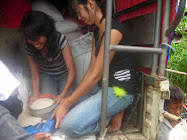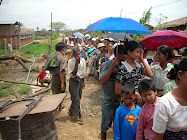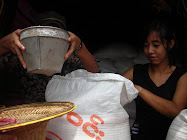KUNGYANGON, Myanmar, May 16 (Reuters)
The rows of beggars on either side of the road stretched for miles, twin columns of human misery left by the winds and waves of Cyclone Nargis.
Without clothes or shoes, the thousands of men, women and children made destitute by the cyclone could only stand in the mud and rain of the latest tropical downpour, their hands clasped together in supplication at the occasional passing aid vehicle.
Any car that did stop was mobbed by children, their grimy hands reaching through a window in search of bits of bread or a t-shirt.
The desperate entreaties expose the fragility of the claims by Myanmar's military government to be on top of the distribution of emergency relief in the worst-hit Irrawaddy delta, where up to 2.5 million people are now clinging to survival.
They also make all the more questionable the reclusive junta's refusal to admit large-scale foreign aid operations and the workers to run them.
That refusal is motivated by fear the operations might threaten the generals' grip on power in a country that has known only military rule for the last 46 years, critics say.
Aid volunteers were shocked by the roadside scenes, which suggest conditions in the delta are deteriorating rapidly with what little rice and food that could be salvaged from the ruins of inundated villages now running out.
"The situation has worsened in just two days. There weren't this many desperate people when we were last here," one relief volunteer said.
In the storm-struck town of Kunyangon, around 100 (60 miles) southwest of the former capital, Yangon, the situation was little better, even though the former Burma's military rulers have started distributing small amounts of emergency food there.
"I am one of the few survivors," said one lady in her 60s, who did not want to be named. "I came here to ask for some rice."
Her clothes -- a grubby grey top and faded black longgyi, or sarong -- are the same she wearing when the May 2 storm struck, sweeping away her home and possessions.
"I only survived by climbing a tree," she said.
Around the town, the countryside remains a mess of half-submerged trees, snapped electricity pylons or bamboo poles -- the skeletal remains of a house -- leaning at crazy angles.
Villagers say they are slowly burying the bloated corpses of friends and relatives that have littered the rice fields for the last two weeks. But the stench of death remains.
PRIVATE AID
Frustrated by the speed of the official response, ordinary people were taking matters into their own hands, sending trucks and vans into the delta with clothes, biscuits, dried noodles, and rice provided by private companies and individuals.
"There are too many people. We just cannot give enough. How can the government act as if nothing happened?" said one volunteer, who declined to be named for fear of reprisals.
Some said pro-regime thugs were even harassing volunteers in the western suburbs of Yangon.
Soldiers at military checkpoints leading out of the city were seizing digital cameras from aid volunteers to try to stop news leaking out to the outside world, others said.
With almost total distrust of the government, private aid is being left in the care of Buddhist monasteries, to be distributed by the monkhood, whose immense moral authority makes it the only institution capable of standing up to the military.
Going through the roll-call of the needy is a grim task.
"We need to give aid to this family," said one monk pointing to a list in a temple in one village.
"No," another monk beside him interjected. "They're all dead." (Writing by Ed Cropley; Editing by Jerry Norton)
skip to main |
skip to sidebar







Workers pour rice into bags to be loaded on to a truck for distribution, in Yangon, Myanmar, Wednesday, May 7, 2008. Cyclone victims in Myanmar's biggest city faced new challenges Wednesday as markets doubled prices of rice, charcoal and bottled water, belying government claims that life was returning to normal after a storm that claimed some 22,000 lives. (AP Photo)
If you would like to be involved in the relief effort, please contact New Life Christian Church at newlife1@singnet.com.sg
Back to main Blog



Workers pour rice into bags to be loaded on to a truck for distribution, in Yangon, Myanmar, Wednesday, May 7, 2008. Cyclone victims in Myanmar's biggest city faced new challenges Wednesday as markets doubled prices of rice, charcoal and bottled water, belying government claims that life was returning to normal after a storm that claimed some 22,000 lives. (AP Photo)